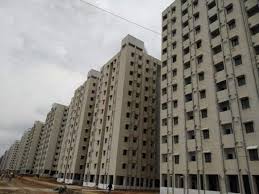Roti, Kapda, aur Makaan was the clarion call of the then Prime Minister Shri Indira Gandhi to make India a self-sufficient country. These three tenets have been the quintessential demand for generations of Indians. While India became an agricultural powerhouse and one of the largest textile producers, it is housing that lagged and today still has some way to go.
Housing in India has for long been seen as a status symbol, rather than a necessity. It is considered a major milestone in life, a luxury, which is why millennials and quadragenarians are content with sharing their apartments with other people or taking the rental route to save on property costs. And since renting or co-living is cheaper than buying, the concept of owning a home has never dawned upon the young folks.
However, the deferment of homeownership is not solely a people’s problem. India’s housing programmes have for decades been myopic and failed to meet the basic housing needs of the growing populace owing to a lack of understanding of the housing problem. Moreover, lack of transparency, miscommunication and physicality of the home-buying process have deterred homebuyers from fulfilling their aspirations of owning a home.
A new consciousness in homebuying
The introduction of RERA and the neo-digital homebuying process post-pandemic, which includes virtual 3D tours, digital transactions, online loan approvals & mortgage sanctions, have resonated well with homebuyers and have translated into huge transactions.
What’s more, people have graduated in homebuying consciousness looking at the ferocity of the pandemic and the hygiene & social distancing measures that are needed to keep the virus at bay. They have realized the importance of owning a home as an emotional security to protect themselves from any future pandemic scenario.
Like Roti and Kapda, the next most essential thing now is a makaan. Millennials and young blood are now looking at homes as a space that provides identity, privacy, security and comfort. With the corporate world looking at work-from-home as a norm, professionals are looking for an upgrade that will suit their working routine as well as keep their family safe.
Existential threats warrant the necessity of a safe, adequate home
In the present pandemic scenario, the only thing that can keep us safe from the existential threat outside is a home. Stay at home, frequent hand-washing and social distancing orders won’t be enough to stop the virus from wiping us away, if people don’t have a safe and habitable home.
In India, where most people live in dingy, unsafe and inadequate rental accommodations that are both a civil and health hazard, a second or third pandemic wave before the arrival of a potential vaccine can be disastrous. And with threats of rental evictions becoming a thing of late, the picture of economic and social devastation for many families can be a reality. Hence the clamour for buying affordable homes has become louder.
Affordable housing-the need of every Indian now
Decent, affordable housing is the requisite of the hour with the way the pandemic has encroached upon our lives. The shortage of housing units has been noticed to the tune of 95% in the EWS (economically weaker section) category.
To prevent the number of citizens living in slums and precarious rented accommodations, the central government, state government and private realty developers should work in cohesion and make affordable housing available to everyone.
Hurdles such as delay in approvals, raw material costs and profit margins should be sorted out and streamlined by the government to ensure smooth delivery of homes within the promised period. Both the government and private developers must ensure that housing projects are sustainable and join hands for their upkeep and development. Because like food and clothing, housing should be a right and not just a necessity only.





